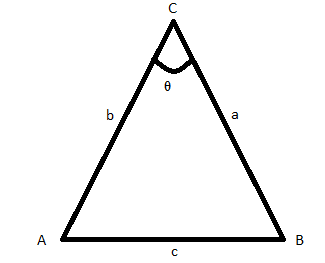Question
Question: The area \[\left( \Delta \right)\] and angle \(\theta \) of a triangle are given, when the side oppo...
The area (Δ) and angle θ of a triangle are given, when the side opposite to the given angle is minimum, then the length of remaining two sides are
A) sinθ2Δ,sinθ3Δ
B) sinθ2Δ,sinθ2Δ
C) sinθ4Δ,sinθ2Δ
D) sinθ6Δ,sinθ6Δ
Solution
We can draw a diagram to represent the triangle and write the area of the triangle as half times the product of the two sides and the sine of the included angle. Then we can write the 3rd side in terms of the other two sides and the included angle. Then we can minimize the function. Then we can find the value of a and b when the other side is minimum. Then we can obtain the answer by comparing it with the options.
Complete step by step solution:
We can draw a triangle representing the sides and angles.

We know that the area of a triangle from any 2 sides and the angle between them is given by, half times the product of the two sides and the sine of the included angle. So, we can write the area in terms of the given angle.
⇒Δ=21×a×b×sinθ
On rearranging, we get,
⇒2Δ=a×b×sinθ
Now we can write a in terms of b.
⇒a=b×sinθ2Δ … (1)
Similarly, we can write b in terms of a
⇒b=a×sinθ2Δ … (2)
Now we can represent the third side using the cosine rule.
⇒c=a2+b2−2abcosθ
Now we can substitute equation (2).
⇒c=a2+(a×sinθ2Δ)2−2aa×sinθ2Δcosθ
On simplification, we get,
⇒c=a2+a2sin2θ4Δ2−sinθ4Δcosθ
The last term is constant so the value of c is minimum when the other 2 terms are minimum. Now we can take the inequality of AM and GM of the other 2 terms.
⇒2x+y⩾xy
On multiplying both sides with 2, we get,
⇒x+y⩾2xy
On substituting the values, we get,
⇒a2+a2sin2θ4Δ2⩾2a2×a2sin2θ4Δ2
On cancelling the common terms, we get,
⇒a2+a2sin2θ4Δ2⩾2sin2θ4Δ2
On taking the root in the RHS, we get,
⇒a2+a2sin2θ4Δ2⩾2sinθ2Δ
On further simplification, we get,
⇒a2+a2sin2θ4Δ2⩾sinθ4Δ
On substituting 2Δ=a×b×sinθ
⇒a2+a2sin2θa2b2sin2θ⩾sinθ2absinθ
On cancelling the common terms, we get,
⇒a2+b2⩾2ab
So, the minimum value occurs when a2+b2=2ab .
Now using this condition, we can find a relation between a and b
⇒a2+b2=2ab
On rearranging we get,
⇒a2+b2−2ab=0
On applying the identity, we get,
⇒(a−b)2=0
On taking square root on both sides, we get,
⇒(a−b)=0
On rearranging we get,
⇒a=b
On substituting in equation (1), we get,
⇒a=a×sinθ2Δ
On multiplying throughout with a, we get,
⇒a2=sinθ2Δ
On taking the square root, we get,
⇒a=sinθ2Δ
As a=b , we can write,
⇒b=sinθ2Δ
So, we get the other sides as sinθ2Δ,sinθ2Δ which is option B.
So, the correct answer is option B.
Note:
We must draw a triangle and label its angles and sides. We must take the side opposite to the vertex A as a and so on. While writing the area in terms of one angle and 2 sides, we must make sure that we take the angle in between them. Inequality of AM and GM is that the Arithmetic mean of any numbers will be greater than or equal to their geometric mean. While taking the square root we take only the positive root as the length of the side cannot be negative. After proving both sides are equal, we must find their value. We cannot compare with the option to get the solution as there are 2 such options where both sides are equal.
